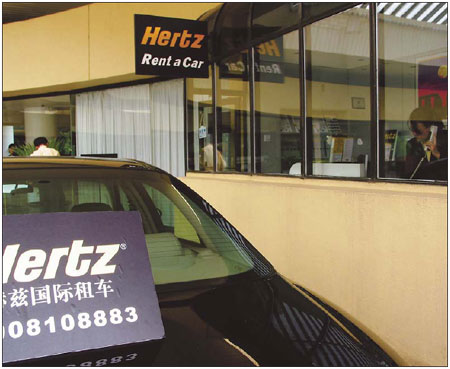Cars
Auto rent business better for locals
(China Daily)
Updated: 2011-01-31 11:13
 |
Large Medium Small |
A Hertz car leasing office in Shanghai. Hertz International, the world's biggest car-leasing network which entered the Chinese market in 2002, largely suspended its rental business on the Chinese mainland in 2006, ending its co-operation with its Chinese partner, China National Automotive Anhua (Tianjin) International Trade Co Ltd (CNAA). [Photo / China Daily]

Sector recognizes potential for huge growth as investors plough money in
BEIJING - Having rich management experience and a mature business model no longer provide advantages for overseas car leasing companies entering the Chinese market, industry analysts say.
"It is still a bit risky for foreign car leasing companies to widely extend their business in the China market because of differences in policies and the financial environment between China and Western countries," said Cui Dongshu, deputy secretary-general of the National Passenger Car Information Exchange Association.
He said China will and has to develop the auto rental market speedily in coming years to meet increasing demand for car use, so the opportunities are huge and attractive.
"However, faced with incomplete nationwide regulations, limited financing options and an immature credit rating system, the difficulties for foreign players are sizable," Cui said.
In 2010, many domestic auto rental companies received investments to enlarge their businesses. Legend Holdings Ltd, parent of Lenovo Group, invested 1 billion yuan ($152 million) in China Auto Rental Ltd, which went on to buy another 6,000 cars to add to its existing fleet of 4,000.
Lu Zhengyao, chief executive officer of China Auto Rental Ltd, said increasing the size of the company was a priority over the next three years.
However, foreign car leasing companies are not aiming to accelerate their development.
Hertz International, the world's biggest car-leasing network, which entered the Chinese market in 2002, largely suspended its rental business on the Chinese mainland in 2006, ending its co-operation with Chinese partner China National Automotive Anhua (Tianjin) International Trade Co Ltd (CNAA).
Hertz International now has a total of five rental stores in China - two in Beijing and three in Shanghai. They mainly lease cars overseas for Chinese tourists or business people who want to book the vehicles in China before their departure but also offer a limited number of local hire cars.
A Hertz representative based in Shanghai said anyone who needs to rent a car from the company has to send an electronic copy of the renter's driving license, identity card, credit card and business card to the office. It usually takes half a day to process the application. If people go to the office in person, it might take two to three hours.
Analysts said the reason why foreign companies cannot make the rental process as speedy as it is in Western countries is because the government doesn't share personal information with them, so checks have to be made before the actual rental process.
Due to its limited number of rental stores, Hertz does not permit cars to be returned to different cities from where they were hired and they don't accept cash as payment. Most domestic car-leasing companies accept both cash and credit cards.
Hao Lan, 23, an office worker in Beijing, said she would love to rent a car when she travels to other cities or has an emergency to deal with. However, she doesn't turn first to foreign car-leasing companies because "the price is high and the renting process is more complicated".
It costs 1,000 yuan for a Chinese customer to rent an Audi A6 sedan from the Hertz Beijing office for one day's use. If the distance traveled exceeds 120 kilometers, the customer is charged 3 yuan for each additional kilometer. Charges vary between makers and models.
"I would rather choose a domestic company because they are more adapted to Chinese situations than foreign ones - plus the numerous advertisements such as China Auto Rental's make them seem more familiar," said Hao.
"Foreign companies are not fast enough to take the opportunities provided by changes in Chinese policies. They have a good business model, but the problem is they need to adjust it to the Chinese business environment such as accepting cash and purchasing more low-end cars instead of the high-end vehicles," said Cui.
Jia Xinguang, an independent auto analyst in Beijing, said it is still not a good time for foreign car-leasing companies to extend their business in the Chinese market because the administrative department in China lacks appropriate regulations and supervision experience of the industry.
"It is hard for the industry players to grow really big because of tight policies on loans and the high cost of cars," said Jia.
However, he said the demand for hire cars is huge in China because of the increasing costs of car maintenance.
"We should encourage motor corporations to cooperate with auto-leasing companies. If they can work together well, the biggest winner will be consumers who will enjoy good service and low prices," he said.
Cui said the auto-leasing market was still developing. When the number of car owners was small, people had not developed the habit of renting cars. That was why the market was not good for companies such as Hertz. In recent years, the number of cars has increased dramatically, so the renting market will grow alongside it.
"Timing is crucial for businesses. China Auto Rental Ltd is a good example - it chose the right time to start and a good time to expand," said Cui. "Whether foreign companies can get a share of the big cake depends on whether they make the right decision at the right time."
| 分享按钮 |



